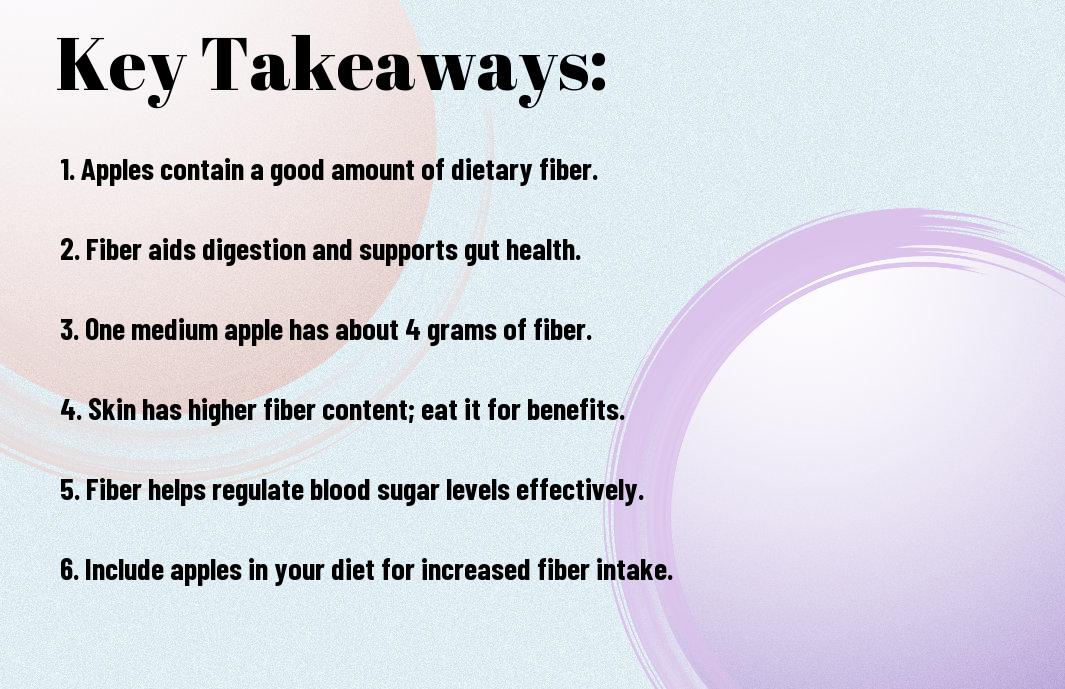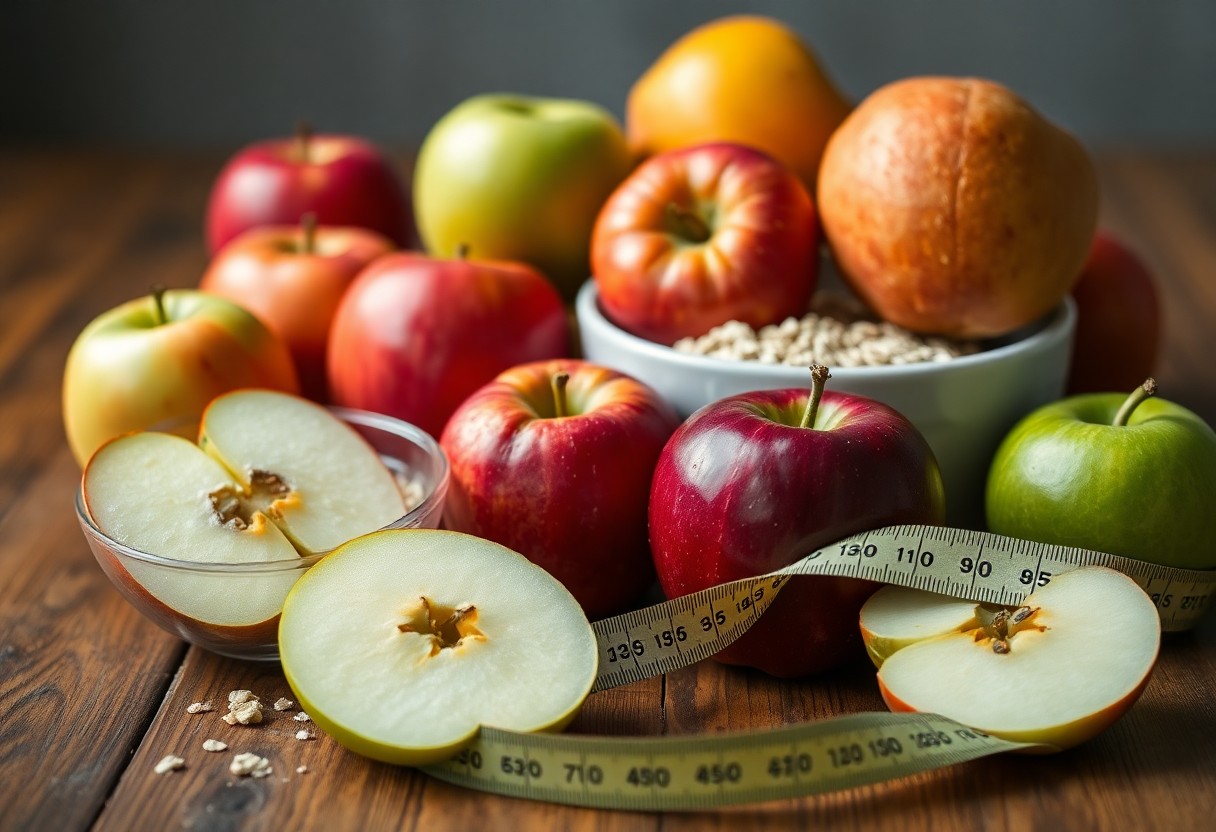You may be wondering about the fiber content of apples and how they fit into your diet. Apples are not only delicious but also a fantastic source of dietary fiber, which plays a significant role in digestion and overall health. In this post, we’ll explore the fiber benefits found in apples, how they compare to other fruits, and tips on how to incorporate them into your meals for maximum health benefits.
Key Takeaways:
- Fiber Content: Apples are a good source of dietary fiber, helping to promote digestive health.
- Types of Fiber: They contain both soluble and insoluble fiber, which can aid in cholesterol management and regularity.
- Health Benefits: Consuming fiber-rich foods like apples can support heart health and weight management.
Nutritional Profile of Apples
To appreciate the health benefits of apples, it’s crucial to understand their nutritional profile. Apples are low in calories yet rich in vitamins, minerals, and antioxidants. They provide a significant source of dietary fiber, which is vital for digestive health. Including apples in your diet can help you meet your daily nutritional needs while also enjoying a deliciously sweet snack.
General Nutritional Values
General nutritional values for a medium-sized apple (about 182 grams) include approximately 95 calories, 25 grams of carbohydrates, and 4 grams of dietary fiber. Additionally, apples contain a range of vitamins and minerals such as vitamin C, potassium, and various phytochemicals beneficial for your health.
Fiber Content Comparison
Below is a fiber content comparison of apples with other common fruits:
| Fruit | Fiber (grams) |
|---|---|
| Apple | 2.4 |
| Banana | 2.6 |
| Orange | 2.4 |
| Pear | 3.1 |
This comparison highlights that while apples provide a decent amount of fiber, they are on par with oranges and slightly lower than bananas and pears. Choosing a variety of fruits in your diet, including apples, will help you achieve your desired fiber intake for enhanced digestive health.

Health Benefits of Fiber in Apples
It is well-known that apples are not only delicious but also packed with health-promoting fiber. This soluble fiber can help regulate blood sugar levels, lower cholesterol, and promote a feeling of fullness—all of which contribute to overall well-being and a healthier diet. Including apples in your daily intake ensures you gain the myriad benefits fiber provides, supporting your journey towards optimal health.
Digestive Health
The fiber found in apples plays a significant role in supporting your digestive health. This natural roughage helps to keep your bowel movements regular, preventing constipation and promoting a healthy gut. Additionally, fiber acts as a prebiotic, feeding your beneficial gut bacteria and creating a balanced microbiome that contributes to overall digestive wellness.
Weight Management
Across various studies, apples have been highlighted as an excellent addition to a weight management plan due to their fiber content. Eating apples can help you feel fuller for longer, reducing the likelihood of overeating or indulging in unhealthy snacks between meals.
Considering the relationship between fiber and appetite control, incorporating apples into your diet can be a strategic choice for managing your weight. The combination of fiber and water in apples not only adds volume to your meals but also slows digestion, ensuring that you stay satiated longer. By choosing apples as a healthy snack or part of your meals, you are taking a positive step towards achieving and maintaining your desired weight.

Different Varieties of Apples and Their Fiber Content
Many different apple varieties exist, each with varying fiber content. In particular, apples such as Fuji, Granny Smith, and Gala offer beneficial fiber levels that can help support your digestive health. For more detailed insights, check out this resource on Apples: Benefits, nutrition, and tips.
Common Varieties
Varieties like Honeycrisp and Jonagold not only offer a delightful taste but also contribute to your fiber intake. Honeycrisp apples, for instance, provide around four grams of fiber per medium-sized fruit, making them an excellent choice for a healthy snack.
Regional Varieties
Fiber content can also vary with apples grown in different regions. Apples from cooler climates tend to be crisper and may offer slightly different nutritional profiles than those from warmer areas.
Even within a single country, the local growing conditions, soil composition, and climate can influence the fiber content in apples. Exploring various regional varieties can enhance your experience and knowledge about apples while giving you the opportunity to benefit from the diverse nutritional aspects they offer.
Ways to Incorporate More Apples into Your Diet
Now, finding ways to add apples to your daily routine can be both enjoyable and beneficial for your health. You can slice them up as a convenient snack with nut butter, toss them into your breakfast oatmeal, or mix them into salads for a sweet crunch. With such versatility, incorporating apples into your meals can enhance not only flavor but also your fiber intake.
Fresh Consumption
Behind every healthy diet, fresh apples play a significant role. You can grab an apple on your way out the door, pack them in your lunch for a refreshing afternoon snack, or enjoy them at breakfast. Their natural sweetness makes them an easy choice for a satisfying and nutritious option throughout your day.
Recipes and Culinary Uses
Above all, apples can elevate countless recipes in your kitchen. You might consider baking them into pies, blending them into smoothies, or adding them to savory dishes like pork or chicken for an unexpected flavor twist. Apples can transform your meals and offer a delicious way to boost your fiber intake.
Ways to utilize apples in your culinary adventures can be creative and fun. For instance, a classic apple crisp or a warm apple cider can make for comforting desserts, while adding them to stir-fries or salads can provide a refreshing balance. You can also try mixing diced apples into your granola or yogurt for a nutritious twist. The possibilities are endless, allowing you to explore the delicious ways apples can enhance your daily meals.
Myths and Misconceptions About Apples and Fiber
Unlike some beliefs, apples are not the ultimate source of fiber, but they do offer a healthy amount. Many people think that just because apples are natural and widely consumed, they must be loaded with fiber. However, understanding their fiber content in comparison to other fruits and vegetables is necessary in assessing their role in your diet.
Common Myths
About apples, there’s a common myth that they contain an exceptional amount of fiber compared to other fruits. While apples certainly contribute to your daily fiber intake, they are not necessarily more fiber-rich than other options like pears or berries, which might have a higher soluble fiber content.
Scientific Clarifications
Behind the misconceptions, scientific research indicates that the fiber content in apples varies by type and preparation method. Fresh apples with skins offer more fiber than peeled ones, but they still average around 4 grams per medium apple, which is lower than some other fruits and vegetables.
Plus, understanding the types of fiber found in apples is important. Apples are a good source of both soluble and insoluble fiber, with soluble fiber aiding in heart health and digestion, while insoluble fiber helps maintain bowel regularity. So, while apples are nutritious and beneficial for your health, diversifying your fruit choices can maximize your fiber intake.
Expert Opinions on Apple Fiber
After researching various studies and expert opinions, it’s evident that apples are a valuable source of dietary fiber. Many health professionals emphasize that incorporating fiber-rich foods like apples into your diet can help improve digestive health. For more information, check out the Top High-Fiber Foods to Help Your Digestive Health.
Nutritional Experts
For nutritional experts, apples stand out as a snack that combines taste with health benefits. Their soluble fiber, especially pectin, plays a significant role in lowering cholesterol levels and promoting gut health, making them a smart addition to your diet.
Dietary Guidelines
Guidelines from dietary experts recommend that adults consume about 25 to 30 grams of fiber daily for optimal health. Including fiber-rich foods like apples can help you meet this goal, enhancing your overall well-being.
Expert opinions suggest that meeting your daily fiber requirements can lead to improved digestive function and reduced risk of chronic diseases. By integrating apples into your meals, you not only enjoy their delicious flavor but also boost your fiber intake effectively.
Conclusion
Now that you know apples are indeed high in fiber, you can easily incorporate them into your diet for better digestive health and increased satiety. With about 4 grams of fiber in a medium-sized apple, these fruits can help you meet your daily dietary needs while providing crucial nutrients and antioxidants. So, next time you’re looking for a healthy snack, consider reaching for an apple to boost your fiber intake and enhance your overall well-being.
FAQ
Q: Are apples high in fiber?
A: Yes, apples are considered a good source of dietary fiber. A medium-sized apple with the skin contains about 4 grams of fiber, which is approximately 14% of the daily recommended intake for adults. This fiber content contributes to digestive health and can help maintain a balanced diet.
Q: What type of fiber do apples contain?
A: Apples primarily contain two types of fiber: soluble and insoluble. Soluble fiber can help lower cholesterol and regulate blood sugar levels, while insoluble fiber aids in digestion by promoting regular bowel movements. Both types contribute significantly to overall health.
Q: Do I need to eat the skin to get the fiber from apples?
A: Yes, the skin of the apple contains a substantial amount of its fiber content. Eating apples with the skin on allows you to maximize the fiber intake, as peeling them removes a significant portion of this nutrient. Therefore, it is generally recommended to consume apples unpeeled for the best health benefits.
Q: How do apples compare to other fruits in terms of fiber content?
A: Apples have a moderate fiber content compared to other fruits. For instance, berries like raspberries and blackberries are higher in fiber per serving. However, apples are still a great option due to their accessibility, taste, and versatility in various dishes, making them a beneficial addition to your diet.
Q: Can eating apples help with weight loss due to their fiber content?
A: Yes, incorporating apples into a weight loss plan can be beneficial. The fiber in apples can promote a feeling of fullness and reduce overall calorie intake. Additionally, the natural sugars in apples can satisfy sweet cravings without the additional calories found in processed snacks. This combination makes apples a healthy choice for those looking to manage their weight effectively.



